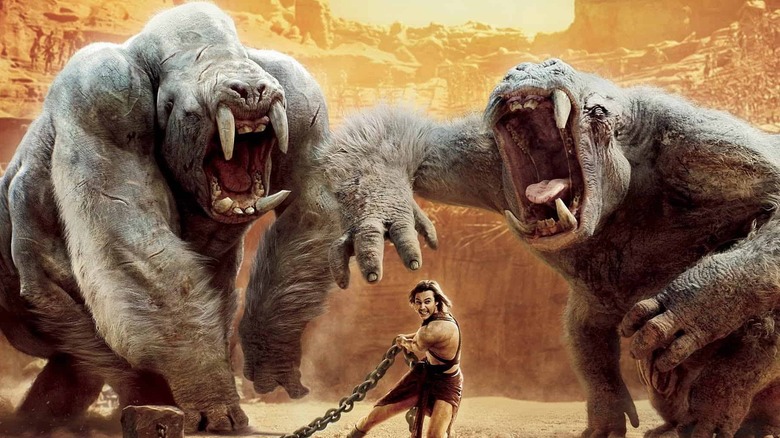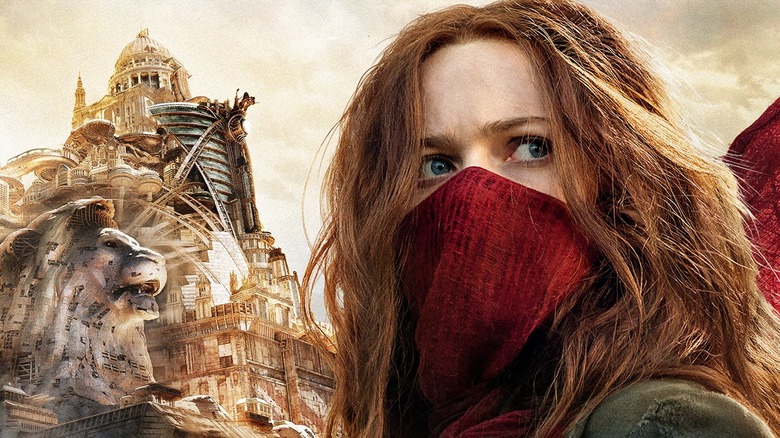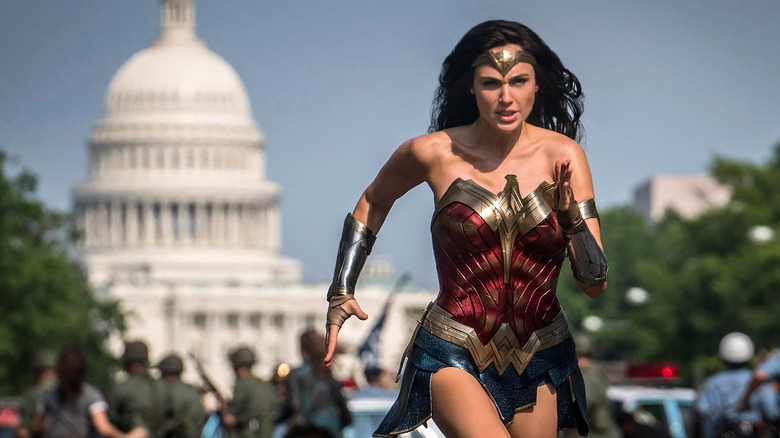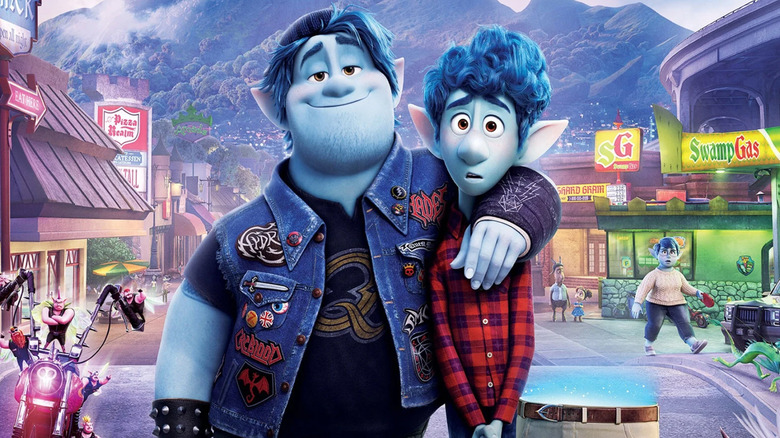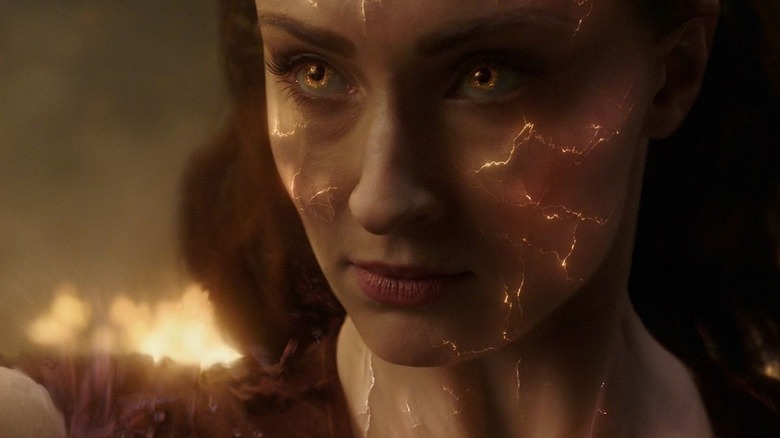Most Of The Biggest Box Office Bombs Of All Time Were Made After 2010
Children of the 1980s know of Michael Cimino's "Heaven's Gate" mostly as a punchline. Made for a whopping $44 million in 1980 (about $150 million in 2022 dollars), the 219-minute epic was wracked by a bad production, expensive reshoots, and scandal (Cimino was compared to a dictator and the production was notorious cruel to animals). "Heaven's Gate" made a mere $3.5 million ($11 million, adjusted) and went into the record books as one of the biggest money-losers in history.
"Heaven's Gate" is one of those unfortunate films to have its financial failure directly tied to any story about it. Few essays on "Heaven's Gate" will discuss its characters, its script, its story, or its photography. The same can be said of "Howard the Duck," "Hudson Hawk," "Ishtar," "Battlefield Earth," or, in more recent years, "The Lone Ranger," "Mortal Engines," or "Valerian and the City of a Thousand Planets." You may love or hate any of those titles — I am personally a "Valerian" stan — but each of them has a bad reputation that precedes it.
Two of those films just mentioned were among the biggest box office bombs of all time; that is: they lost the most amount of money — adjusted for inflation — for their studios. Those two, "The Lone Ranger" and "Mortal Engines," are also of the more recent vintage. Indeed, looking up the biggest box office bombs of all time, you may find that the bulk of them were made very recently, with some of history's greatest failures coming out just recently. Why haven't we heard more about these failures? Are studios usually eager to celebrate their losses?
The Biggest Bombs
The biggest box office bomb of all time remains 2012's "John Carter," a film made for a reported $263 million (!) and that opened domestically to a mere $30 million. Overall, the film grossed $285 million worldwide, which looks like it more or less broke even, but budgets rarely factor in the extensive marketing or distribution costs, leaving distributor Disney in the hole for about $200 million ($242 million in 2022). These numbers come from Box Office Mojo.
The second biggest bomb of all time was also an attempt by Disney to recreate their "Pirates of the Caribbean" lucre (classic lit adventure novel hero, overblown plot) in the form of "The Lone Ranger." Gore Verbinski's 2013 film reportedly cost $215 million, and opened to $29 million. Worldwide, it made about $260 million, still shaking out to a loss of up to $190 million ($226 million, adjusted).
Continuing: The third biggest loss was 1999's "The 13th Warrior" (loss of up to $200 million, adjusted), followed by 2018's "Mortal Engines" ($180), 1995's "Cutthroat Island" ($178), 2003's "Sinbad: Legend of the Seven Seas" ($176), 2012's "Battleship" ($169), 2011's "Mars Needs Moms" ($166), and a near tie in 2015 between "Pan" and "Tomorrowland" which lost $164 million (adjusted) each.
A few things may stand out about that list of titles. Notably, Disney is responsible for half of them ("John Carter," "The Lone Ranger," "The 13th Warrior," "Mars Needs Moms" and "Tomorrowland"). More notably, perhaps, is that seven of them were made after 2010. It's been true for a while that film budgets have been ballooning out of control, and that mid-budget movies appear to be effectively dead, at least as far as theatrical release goes, but Hollywood's current model of high-risk, big-budget gambles in favor of high-return, billion-dollars-a-weekend openers has been losing at least as much money as it has been earning.
The More Recent Bombs
Indeed, some of the more recent money losses occurred in just the last two years alone. The closure of theaters due to COVID-19 is certainly a key contributing factor, but that's based on the assumption that films like "Mulan" and "Wonder Woman 1984" would have been guaranteed successes. However one wishes to speculate, the fact remains that "Mulan" and "Wonder Woman 1984" each lost more money for their studios than "Heaven's Gate" ever did. "1984," made for a reported $200 million, only made $163 million for Warner Bros., equaling a loss of up to $143 million. "Mulan's" numbers are about the same, losing about $142 million for Disney.
While "Heaven's Gate" may still linger as a high water mark for failure, it lost less money than "Dark Phoenix" ($137 million), "A Wrinkle in Time," ($135 million), "Terminator: Dark Fate" (up to $134 million) and "Onward" ($131 million).
The frequency of gigantic losses, then, has become incredibly common. Studios are pouring more and more money into fewer and fewer films leading to a lack of variety in entertainment options (they're all brand-driven, FX-based extravaganzas) and a higher chance of audiences not connecting with more of them. For every "Avengers: Endgame," there appear to be a dozen "Tomorrowlands." And because many of these films are made by very brand-conscious companies — Disney is in the habit of selling the notion of studio-as-auteur — when a high-profile failure does come along, they tend to bury it. You might have noticed that "Mars Needs Moms" only just recently snuck its way onto Disney+ with no fanfare. "Tomorrowland" — named after a section of Disneyland — is not on Disney+, but you can stream it on Starz. In other words, it's not available.
Spend a lot, lose more, then bury the bodies in the desert. This doesn't appear to be a healthy way to run an entertainment business.
Getting on the Studio's Side
Returning for a moment to the above-mentioned notion that Disney has been training audiences to see the studio itself as an auteur: It's possible many of the biggest bombs of all time — the ones owned by Disney, which is a lot of them — aren't mentioned as often as "Cats" or "Battlefield Earth" because Disney has done such a good job of protecting their own brand. For decades, Disney has sold their films not on the names of the directors, but on the studio putting it out. This became especially sharp after they acquired Pixar, then Marvel, then Lucasfilm. Audiences would flock to the latest Marvel film, not necessarily the latest Jon Watts joint; indeed in many cases, the studio and the characters matter more than the actors or directors involved; any reasonably competent director could have made "Spider-Man: No Way Home." The impressive feat was the legal juggling that allowed certain characters to appear on screen together. I'd be interested to see how well the first non-Marvel Jon Watts film does. If The Russo Bros. "Cherry" is any indicator, not well.
As such, audiences have started to come to the "rescue" of corporations. In reading some of the above, you too may have been forming counterarguments in your mind about how certain films deserve to be hits, Covid was a problem, and how you did your part in supporting these poor beleaguered blockbusters. Twitter users regularly boast about how much money their favorite superhero flick made over the weekend as some sort of objective measure of its quality. Disney, Marvel, Pixar, etc. are unassailable, and it's now outside forces that drive down their grosses. It's haters. It's critics. It's bad advertising. The films themselves all deserve to succeed in this mindset, not matter the quality.
So we can rag on "Battlefield Earth" or "Cats" all we want, even though they lost far less money than "Treasure Planet."
This devotion to a studio strikes this writer as insidious. Audiences are the ones paying the money. It's them who deserves to "win" in this situation by getting a film they like. How much money a film earned for a studio they don't work for, or lined the pockets of executives they never met, should have no bearing on a conversation about the film itself. Sure, audiences may say they want a sequel, but that's focusing on what is to come, and not the film right in front of us.
A Solution?
Is there a solution to stemming the flow of high-risk, overbudgeted blockbusters that lose more and more money? There may not be. As long as there is an occasional billion-dollar hit, studios will likely continue to take the risks, even if there will be more bombs than successes. Mid-budget films have an outlet in the streaming world, while movie theaters are increasingly the sole purview of genre studio fare. It may be time to face a future where we finally acknowledge that streaming is the primary source of film consumption, and cinemas are reserved for Marvel.
If you love Marvel and Star Wars, then you'll have crowded theaters and cheering crowds to join you. If you want anything else, well, there's always Ovid.
